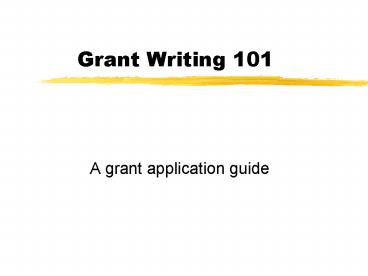Grant Writing 101 - PowerPoint PPT Presentation
1 / 24
Title:
Grant Writing 101
Description:
Tailors the description of the idea to the interest of the grant ... Become friends with the bookkeeper and keep him/her informed. Activity. Activity: Budget ... – PowerPoint PPT presentation
Number of Views:190
Avg rating:3.0/5.0
Title: Grant Writing 101
1
Grant Writing 101
- A grant application guide
2
Grant Information
- Where to Start
- Idea Sources
- Needs
- Goals
- Objectives
- Methods and Activities
- Evaluations
- Budget
- Timeline
- Abstract
- Writing Tips
3
Where Do You Start?
- Read the grant carefully
- Form a committee
- Gather information
- Decide how to use the purpose of the grant to
meet needs - Investigate the research
- Write using the rubric
4
Establish a Team
- Good researcher or librarian
- Good writer
- Good proof reader
- Good word processor
- Good accountant
- Stakeholders who will be involved
5
Idea Sources
- Brainstorm with other inventive people
- Develop wish lists
- Identify needs
- Target funding sources
- Examine currently funded programs
- Adapt existing innovations
- Review professional journals
- Attend professional conferences
6
The Hook
- Tailors the description of the idea to the
interest of the grant - Aligns the project with the purpose and goals of
the grant - Compels the reviewers to see the proposal as
deserving funding
Activity
7
Activity Grant Reader
- Need K-1 Technology Grant for Teacher and
Learning RFP (request for proposal) - Grant for School A
- Grant for School B
- Rubric
- Record sheet
8
Components of a Grant
- Cover page
- Abstract/summary of project
- Background information
- Problem statement
- Project objectives
- Methods and activities
- Professional development
- Evaluation
- Partnership
- Time line
- GEPA
- Budget
9
The Gap is the Need
- Who has the need?
- What need do they have?
- How was the need determined?
- Why is the need critical?
- Is there data to support the need?
10
Tips for Need Statements
- Accentuate the positive
- Emphasize the opportunity
- State the action plan
- State the problem to solve
- Base the request on needs not wants or things
11
Goals
- Outline the expected benefit
- Focus on the needs
- Provide a clear outcome of the project
12
Measurable Objectives
- Content - what do you want?
- Process - action verb
- Product - what will be completed or used to
evaluate - Measure of assessment - percent of students
meeting level of acceptable performance
13
Examples of Objectives
- Vague Students will be able to identify
beginning and ending sounds of single syllable
words. - Measurable 80 of students will be able to
follow text from left to right, top to bottom,
and identify simple c-v-c words. Gains will be
shown using the Title 1 K Early Childhood
Assessment in Reading.
14
Methods and Activities
- Define what is being done to meet the objective
- Describe how, when, where, why and who
- Include academic standards addressed
- Correlate with students development
- Link to evaluation
15
Formative Evaluation
- Provides data during the course of the project.
This can help to improve the design of the
project. - Examples Surveys, journals, feedback from
discussions, focus groups
16
Summative Evaluation
- Measures how well the population achieves the
goal. Usually administered at the end of the
project. - Examples Standardized tests, authentic
assessments, attainment of benchmarks
Activity
17
Activity Evaluating the Flow
- Need grants for Schools A and B
- Examine objectives, activities, standards, and
evaluations - Complete the flow grid
- Critique
18
Budget Errors
- Addition and multiplication mistakes
- Correlation mistakes not noted in activities
- Something not allowed
- Budget didnt match grant
- Unrealistic price
- Required percentage not met
19
Estimate the Budget
- Determine what needs to be paid with the grant
funds. - Personnel
- Benefits
- Staff development
- Material/Supplies
- Equipment
20
Budget Tips
- Keep a running budget page while writing the
grant. - Talk with the business manager before obligating
any funding from the school district. - Become friends with the bookkeeper and keep
him/her informed.
Activity
21
Activity Budget
- Examine the budget for School E
- Look for errors
22
Timeline
- Is it reasonable?
- What are the activities and critical tasks?
- Who will initiate and follow through?
- When will this happen?
23
Abstract
- Clear and concise summary of the proposal
- Write after proposal is completed
24
Writing Tips
- Adhere to the RFP rules sequence
- Make sure to complete all sections
- Use the required font size
- Write in third person
- Make sure each activity ties to an objective
- Include the correct number of pages
- Budget only for authorized expenses
- Use realistic prices
- Meet the deadline
25
Polishing the Document
- Read the document again in one sitting to check
the flow - Check to make certain all requested items are
included - Engage an outside reader for critique
- Make several copies and submit
- Secure original signatures
26
If Unsuccessful
- Contact agency to get evaluators notes
- Save grant for other opportunities
- Be encouraged not every application is funded
- Try again!
27
Grant Writing 101
- By
- Kathy Keck kkeck_at_chs.cville.k12.in.us
- Dr. Kathy Steele ksteele_at_admin.cville.k12.in.us































